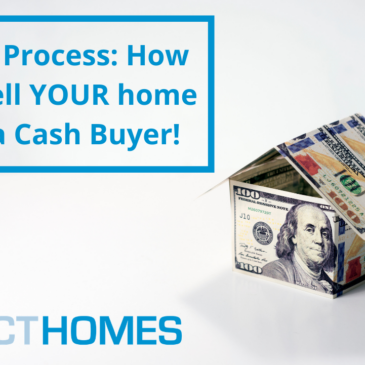In many markets’ property values have taken off to levels not seen in well over a decade. Depending on your financial situation and the growth of your market it may be a great time to explore cashing out and selling your home. Depending on the condition of your home, the buyer of your property may be a cash buyer.
There are some nuances and slight differences when working with a cash buyer instead of a traditional financed one. Being aware of these slight differences and knowing what to expect next in the transaction will help you plan, manage expectations, and clear potential hurdles for an easy closing.
Here are six steps to consider when selling your home to a cash buyer!
Step 1 – Find and Qualify your Buyers
The first step in selling on your home for cash is finding the RIGHT buyer. With the growth of social media and power of the internet, it is easier than ever to advertise your property. To attract attention to your property, you could post a FSBO (For Sale by Owner) listing on Zillow or similar website. You could do a quick google search of highly rated investors in your area and reach out to start the process. Most cash buyers are quick and responsive and are happy to submit a cash offer should you be interested in one!
Once you get a couple of interested buyers it’s reasonable to expect that one of them will make an offer. Cash buyers shouldn’t need more than 24 hours to get you an offer, especially after walking the property! It’s always a good idea to get multiple offers / opinions if you can. When you’re ready to make a decision on offers you have in hand, it’s a good time to remind yourself that price is NOT the only term to pay attention to in an offer. The right buyer should put forth an offer with the ideal balance of price, inspection period, closing timeline, and special terms that put you in the best possible position to achieve your goal with selling the property. It’s also important at this stage to research the buyers BEHIND the offer.
Questions to ask of your potential buyer…
- Who are they?
- How long have they been around?
- Are they local?
- Can I trust them to execute on the terms of the contract?
To help you in your decision making, here’s a great checklist on what to look for in a strong cash buyer! Take to the internet and do some research on testimonials and any reviews you can find. Try to get a sense of how experienced they are and how many years they’ve been in the business. The longer a buyer has been investing the more likely they are to close! If you’re looking for an offer on your property Reach out to us here!
Remember: accepting an offer that doesn’t end up closing not only wastes your time, and potentially money, but deters you from negotiating with real buyers who are legitimately qualified. Do your research!
Step 2 – Compare Offer Terms
Inspections
How long will the buyer need to complete their inspections? It’s reasonable to expect that any buyer will perform some type of inspection after you accept an offer. Typically, it’s agreed that the time period for inspection starts the day after an offer is accepted or “Executed” . You want inspections to be done as soon as the contract is accepted. If there are issues you need to know about them before you get too deep in the transaction. The inspection can be anywhere from a half hour to numerous hours depending on the specific inspector. You can try to impart information about the property, but they are going to do their own legwork regardless of what you tell them. It is important to understand that the inspection is used as a negotiating tool for buyers. They are almost always going to give you a list of deficiencies with the property in an attempt to knock something off the price. Some are legitimate and some are exaggerated. Don’t take anything the buyer does personally. Understand that there may need to be some give and take at this point. You can stand your ground, but the next buyer may find the same issues on their inspection. Let the market be your guide on where you can concede and where you can take a hard line.
Where can you find “inspection period” on the contract? Section 14 Part B (1) Page 6/10 of California Residential Purchase Agreement – Click Here!
Earnest Money Deposit
Will the buyer have skin in the game? If so, how much? On every contract there is a line where an Earnest Money Deposit (EMD) amount is indicated. In simple terms the EMD is a down payment made that is subtracted from the final amount needed at closing. The EMD is often used as a way to gauge true interest from a buyer and represents their “skin in the game”. If the buyer breaks the contract in any way, or backs out of the deal without justification the seller may be entitled to this money. It is a way to incentivize them to keep their word and not simply shotgun offers without following through. This money should be received within 72 hours aka THREE (3) business days of offer acceptance. For example – if the offer is accepted on Monday the funds should be in escrow by Thursday. Your attorney or escrow company will hold this money in a separate account. Any cash buyer who is truly interested should be able to produce these funds within 3 days. If they’re not able to, it may be a red flag and could be time to start considering back up options.
Where can you find the “Earnest Money” amount on the contract? See Section 1 Part 3, Page 1/10 of California Residential Purchase Agreement – Click Here!
Closing Period
How quickly is the buyer able to close escrow? Is the buyer rushing you to close or do they need too much time? You have a couple options to weigh when considering closing period. You can either close “X” number of days after the contract is accepted OR you can close on a specific day (i.e., January 1st, 2021). It really depends on your preferred closing time period. Here at Linkville Property Solutions, we typically write in 10-90 days, Seller’s choice. This gives you as the seller the ability to choose any tentative days in the next 10 to 90 days to close escrow! You may want to close quickly, or you may want to close NOT so quickly. This 10-90 days verbiage gives you the flexibility you may need!
Don’t know where to find your agreed upon closing period? See Page 1/10, Section 1, Part D, of California Residential Purchase Agreement – Click Here!


